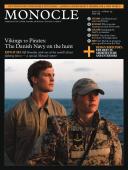
Issue 23
At sea off Somalia with one of the world’s fittest fighting forces – a special Monocle report.
In This Issue
Oops! No content was found.
Looks like we no longer have content for the page you're on. Perhaps try a search?
Return Home
Click here to discover more from Monocle

At sea off Somalia with one of the world’s fittest fighting forces – a special Monocle report.
Looks like we no longer have content for the page you're on. Perhaps try a search?
Return Home